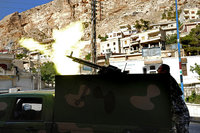Jihadis in Syria
Abu-Abdallah al-Libi, top commander of al-Qaeda front group The Islamic State of Iraq, was killed in the northwestern Syrian town of Idlib on Sunday. The Free Syrian Army immediately denied responsibility for the attack.

A denial that leaves many doubts after the major clashes that took place last Thursday between jihadis and other rebel groups in the cities of Deir Ezzor and Azaz.
The clashes follow an ISIS announcement earlier this week declaring war against the FSA-affiliated Farouk Brigades in Aleppo. Calling the operation "The Repudiation of Malignity," the jihadist group said its offensive was a response to attacks by the brigades against its headquarters in the northern city of al-Bab last week.
On Friday, after ISIS seized the northern border town of Azaz, the opposition National Coalition for the first time publicly condemned attacks by jihadists.
In the meantime other jihadi groups have been responsible for massacres in different parts of the country; on Tuesday September 10th jihadis from Jabhat al-Nusra attacked the village of Maksar al-Hesan, near Homs, killing sixteen Alawites and six Bedouins. The Syrian Observatory for Human Rights has confirmed that seven women, four children under the age of 16 and three men over the age of 65 were among the victims. They were all killed inside their houses and had nothing to do with the clashes.
The previous week Jabhat al-Nusra attacked the ancient Christian village of Maloula; the jihadis entered the town, terrorized and threatened the locals of death unless they would convert to Islam. After a few hours the jihadis were forced by Assad's troops to leave the city and took refuge in the surrounding mounts from where they began to bomb the city. According to locals the jihadis were not Syrians but mainly Chechens, Pakistanis and from the Gulf countries.
Other human rights organizations have claimed that between July 28th and August 2nd Jabhat al-Nusra killed more than 450 Kurd civilians in the areas of Tal Abyad, Tal Hassil and Tal Aran.
On the other hand those rebel factions which have been defined "moderate" by some Western medias and analysts do not necessarily deserve such reputation; an example is the al-Farouq brigades which are also part of the Syrian National Council. In May 2013 one of their leaders, Abu Sakkar, was filmed while extracting and eating the internal organs of an enemy. Another leader of the group, Khalid al-Hamad, claimed to have done the same.
Members of the Brigade were responsible for the kidnapping of the Italian journalist Domenico Quirico and the Belgian teacher Pierre Piccinin. Quirico told the Italian media about the extreme brutality of the group which carried out tortures and even pretended to execute them two times.
In addition other videos of executions carried out by rebels have been published by different medias including the New York Times. In one video the prisoners, seven captured Syrian soldiers, were trussed, their backs marked with red welts. The militants kept their faces pressed to the dirt as the rebels' commander recited a bitter revolutionary verse. The leaders of the execution group, which counts about 300 people, seems to be the 37 year-old Abdul Samad Issa, known in northern Syria as "the uncle". His father was an opponent of former Syrian president Hafez al-Assad and Issa believes that he was killed in 1982 during a government crackdown against the local branch of the Muslim Brotherhood.
At this point it is worth making a consideration on the use of the term "moderate" when referring to such rebel groups. According to which elements can the media use such term to define a faction while indicating another as "extremist"? Is it purely based on the religious ideology? That would not seem quite correct since the events that we have seen have clearly nothing to do with "moderation", no matter if they were carried out by the jihadis or by factions of the FSA.
Giovanni Giacalone
Subscribe to Pravda.Ru Telegram channel, Facebook, RSS!


